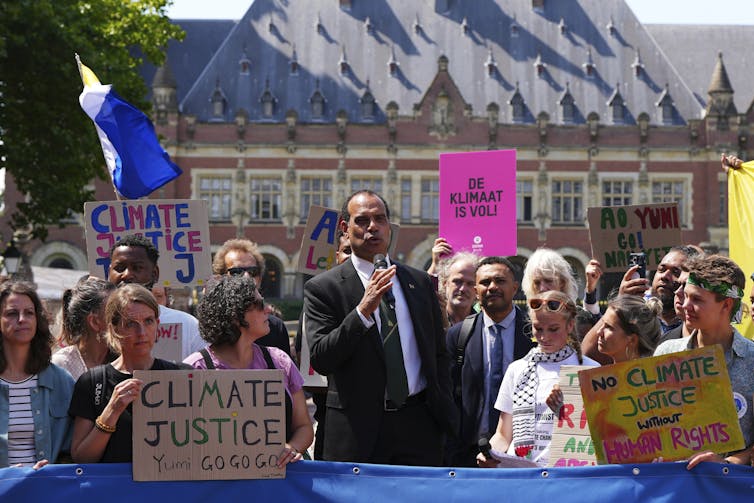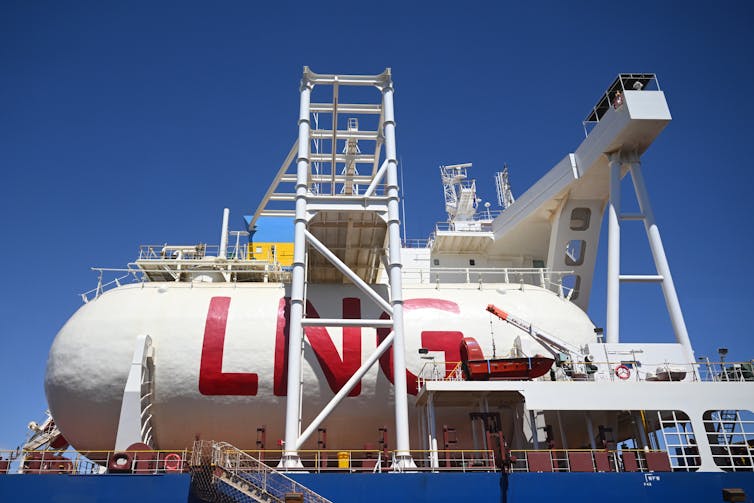- Home
Edition
Africa Australia Brasil Canada Canada (français) España Europe France Global Indonesia New Zealand United Kingdom United States Edition:
Global
Edition:
Global
- Africa
- Australia
- Brasil
- Canada
- Canada (français)
- España
- Europe
- France
- Indonesia
- New Zealand
- United Kingdom
- United States
 Academic rigour, journalistic flair
Academic rigour, journalistic flair
 Mick Tsikas/AAP
Long-awaited environment laws might get Australia sued. Here’s why
Published: November 24, 2025 4.03am GMT
Jacqueline Peel, The University of Melbourne, Julia Dehm, La Trobe University, Nicole Rogers, Bond University
Mick Tsikas/AAP
Long-awaited environment laws might get Australia sued. Here’s why
Published: November 24, 2025 4.03am GMT
Jacqueline Peel, The University of Melbourne, Julia Dehm, La Trobe University, Nicole Rogers, Bond University
Authors
-
 Jacqueline Peel
Jacqueline Peel
Professor of Law, The University of Melbourne
-
 Julia Dehm
Julia Dehm
Senior Lecturer, La Trobe University
-
 Nicole Rogers
Nicole Rogers
Professor of climate law, Bond University
Disclosure statement
Jacqueline Peel receives funding from the Australian Research Council for her Kathleen Fitzpatrick Laureate Fellowship on Global Corporate Climate Accountability.
Julia Dehm receives funding from the Australian Research Council for a Discovery Early Career Research Award and from the Victorian Legal Service Board + Commission grants program for a project on mainstreaming climate change in legal education.
Nicole Rogers does not work for, consult, own shares in or receive funding from any company or organisation that would benefit from this article, and has disclosed no relevant affiliations beyond their academic appointment.
Partners
University of Melbourne provides funding as a founding partner of The Conversation AU.
La Trobe University and Bond University provide funding as members of The Conversation AU.
View all partners
DOI
https://doi.org/10.64628/AA.57v7sssec
https://theconversation.com/long-awaited-environment-laws-might-get-australia-sued-heres-why-270453 https://theconversation.com/long-awaited-environment-laws-might-get-australia-sued-heres-why-270453 Link copied Share articleShare article
Copy link Email Bluesky Facebook WhatsApp Messenger LinkedIn X (Twitter)Print article
Australia is rewriting its national environment laws, and Environment Minister Murray Watt has vowed the legislation will pass the parliament this week, despite not yet reaching agreement with either the Coalition or the Greens. But the current draft bill leaves the country exposed to significant legal, environmental and political risk.
This is because the proposed changes to Australia’s environment legislation, the Environment Protection and Biodiversity Conservation (EPBC) Act, do not require the government to assess the climate impacts of new fossil-fuel projects. Minister Watt has already ruled out changing this.
Yet international and domestic courts are increasingly clear: governments have a legal duty to consider the greenhouse gas emissions released by the projects they approve. Will the federal government create new laws that expose it to more domestic and international court action?
 Ralph Regenvanu, Vanuatu’s minister for climate change, speaks to demonstrators outside the International Court of Justice. The court ruled that countries must act to prevent climate harm.
Peter Dejong/AAP
Ralph Regenvanu, Vanuatu’s minister for climate change, speaks to demonstrators outside the International Court of Justice. The court ruled that countries must act to prevent climate harm.
Peter Dejong/AAP
Landmark legal advice
In July 2025, the International Court of Justice (ICJ), the world’s highest court, delivered a landmark legal opinion. It found countries must act with “due diligence” to prevent significant harm to the climate system. This includes considering the climate harm caused by fossil-fuel production. They must also consider emissions released when fossil fuels are exported and combusted (known as downstream or Scope 3 emissions).
While advisory opinions are not binding judgements, they clarify what obligations countries have under international law. For Australia, this means climate impacts are no longer optional considerations as a matter of international law. They are legally relevant factors that must be assessed before approving high-emitting projects.
If Australia ignores its obligations, other nations may sue it in courts like the ICJ. The international law ruling may also be referenced by litigants in domestic disputes.
The government’s law reform package is a set of seven bills totalling nearly 600 pages. Yet it contains no means of ensuring climate impacts are part of decision-making.
The reforms require partial disclosure of emissions, but this information plays no role in approval decisions. And considering downstream emissions is not required at all, despite representing the majority of pollution from coal and gas projects.
 A ship carrying liquified natural gas (LNG) at Rio Tinto’s Dampier Port in 2025.
Lukas Coch/AAP
A ship carrying liquified natural gas (LNG) at Rio Tinto’s Dampier Port in 2025.
Lukas Coch/AAP
Domestic courts recognise climate link
Australia’s own courts have already begun applying far stricter scrutiny to project approvals. In a court ruling in August, referred to as the Denman decision, the New South Wales Court of Appeal quashed a coal-mine expansion approval. A community environment group successfully argued the planning commission failed to consider the impact of all of the mine’s greenhouse gas emissions.
This decision set a legal precedent. Next, mining giant Glencore’s application to extend its Ulan Coal Mine near Mudgee was declared invalid in mid November. A local environment group successfully argued the mine’s climate impacts had been insufficiently considered during assessment.
The implications of these two decisions go far beyond New South Wales. The reasoning applies to how all Australian states and territories assess major fossil fuel projects. And they inform the federal govenrment’s legal obligations under Australia’s environment laws. Yet despite this, Minister Watt’s draft reforms do not clarify how climate impacts should be addressed under federal law.
 Green Senator Sarah Hanson-Young says her party wants wanted more limits on fossil fuel developments before supporting the new laws.
Lukas Coch/AAP
Green Senator Sarah Hanson-Young says her party wants wanted more limits on fossil fuel developments before supporting the new laws.
Lukas Coch/AAP
Safeguard mechanism won’t fill the gap
Government ministers have argued climate impacts are better addressed under the so-called “safeguard mechanism”. This is a policy that requires large industrial polluters to reduce their greenhouse gas emissions each year.
However, this is not an assessment or approval system. It applies only after a project begins operating and relies heavily on offsets of variable quality. It does not consider downstream emissions.
Most importantly, it does not answer the core environmental law question. Namely, is this project compatible with Australia’s climate goals and international obligations?
Australia out of step
There is an emerging global legal consensus that climate impacts must be assessed as part of project-level approvals.
Three decisions last year point to the change. The International Tribunal for the Law of the Sea ruled assessments of new projects must evaluate emissions affecting the marine environment. The European Court of Human Rights ruled assessments of new petroleum projects must quantify downstream emissions. And the UK Supreme Court held that downstream emissions must be included in environmental impact assessments.
These decisions reinforce the principle that states must assess the full climate impact of projects before approving them – a point also reiterated by the ICJ. Failing to include these requirements in reformed environment laws could leave Australia exposed to domestic judicial review, High Court challenges and international claims relating to climate harm.
Political contradictions
Media reports indicate the Albanese government may negotiate with the Coalition to secure passage of environment law reforms. This comes as the Coalition has removed its commitment to net zero, while saying it would conditionally support new environment laws.
This raises a contradiction. Policymakers and industry groups increasingly endorse “science-based” emissions targets while simultaneously supporting law reforms which would allow high-emitting projects to be approved without assessing their climate harm.
This inconsistency boosts the risk of lawsuits and undermines international credibility, especially as Australia takes on the role of “President of the Negotiations” at next year’s COP31 summit. It also leaves key decisions to ministerial discretion. This means they are vulnerable to political, economic and lobbying pressures.
A better path
Reforming Australia’s environmental laws offers a rare chance to reflect scientific evidence and legal obligations. The law should be written to prevent harm, not to enable it.
The law should be written to prevent harm, not to enable it.
- Fossil fuels
- Climate change
- International law
- Environment
- EPBC Act
Events
Jobs
-
 Lecturer in Paramedicine
Lecturer in Paramedicine
-
 Associate Lecturer, Social Work
Associate Lecturer, Social Work
-
 Lecturer, Communication Design
Lecturer, Communication Design
-
 Leading Research Centre Coordinator
Leading Research Centre Coordinator
-
 Chairperson, Animal Ethics
Chairperson, Animal Ethics
- Editorial Policies
- Community standards
- Republishing guidelines
- Analytics
- Our feeds
- Get newsletter
- Who we are
- Our charter
- Our team
- Partners and funders
- Resource for media
- Contact us
-
-
-
-
Copyright © 2010–2025, The Conversation

 Lecturer in Paramedicine
Lecturer in Paramedicine
 Associate Lecturer, Social Work
Associate Lecturer, Social Work
 Lecturer, Communication Design
Lecturer, Communication Design
 Leading Research Centre Coordinator
Leading Research Centre Coordinator
 Chairperson, Animal Ethics
Chairperson, Animal Ethics


